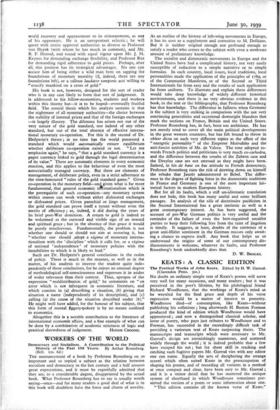WORKERS OF THE WORLD
Democracy and Socialism. A Contribution to the Political History of the Past 150 Years. By Arthur Rosenberg. 12s. 6d.) THE announcement of a book by Professor Rosenberg on .so
important and so topical a subject as the relation between socialism and democracy in the last century and a half arouses great expectations, and it must be regretfully admitted that they are, to a considerable degree, disappointed by the actual book. What Professor Rosenberg has to say is usually worth saying—once—and for many readers a good deal of what is in this book will doubtless have the force and charm of novelty. As an outline of the history of left-wing movements in Europe, it has its uses as a supplement and corrective to M. Dolleans. But it is neither original enough nor profound enough to satisfy a reader who comes to the subject with even a moderate amount of preliminary knowledge.
The socialist and democratic movements in Europe and the United States have had a complicated history, not very easily susceptible of reduction to a simple narrative or to simple formulas. In each country, local issues, local traditions, local personalities made the application of the principles of 1789, or of the Communist Manifesto, or of the Second or Third Internationals far from easy and the results of such application far from uniform. To illustrate and explain these differences would take deep knowledge of widely different historical environments, and there is no very obvious evidence in this book, in the text or the bibliography, that Professor Rosenberg has that knowledge. The difference in fullness when Germany is the subject is very striking in comparison with the not very convincing generalities and occasional downright blunders that mark the sections on France, Britain and the United States. Professor Rosenberg has, in fact, been too ambitious. He has not merely tried to cover all the main political developments in the great western countries, but has felt bound to throw in obiter dicta on such very different topics as the effect of the " energetic personality " of the Emperor Mutsuhito and the anti-fascist activities of Mr. de Valera. The tone adopted to- wards French politics and politicians is very much ex-cathedra, and the difference between the results of the Zabern case and the Dreyfus case are not stressed as they might have been. Indeed, in his de haut en bas attitude to French democracy, Professor Rosenberg runs the risk of drawing down on himself the rebuke that Jaures administered to Bebel. The differ- ence in the degree of fighting force in the democratic traditions in France and Germany is one of the most important his- torical factors in modern European history.
But for all its faults, which a stiff un-idiomatic translation does not hide, this book has many useful and some brilliant passages. Its analysis of the role of doctrinaire pacificism in the Second International has a great intrinsic as well as a great contemporary interest. As has been suggested, the account of pre-War German politics is very useful and the reminder of the failure of even the best-organised socialist parties to keep their following free from the taint of jingoism is timely. It suggests, at least, doubts of the existence of a great anti-Hitler sentiment in the German masses only await- ing a chance to express itself. Any book that helps us to understand the origins of some of our contemporary dis- illusionments is welcome, whatever its faults, and Professor Rosenberg's book undoubtedly does that.
D. W. BROGAN.










































 Previous page
Previous page